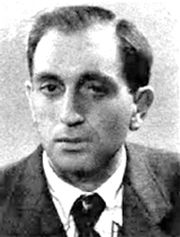Chil Rajchman | |
|---|---|
 Chil Rajchman in Poland, c. 1945-1946 | |
| Born | Henryk Reichman June 14, 1914 |
| Died | May 7, 2004 (aged 89) |
| Known for | Survivor of revolt at Treblinka, author of Treblinka memoir |
Chil (Enrique) Meyer Rajchman a.k.a. Henryk Reichman, nom de guerre Henryk Ruminowski (June 14, 1914 – May 7, 2004) was one of about 70 Jewish prisoners who survived the Holocaust after participating in the August 2, 1943, revolt at the Treblinka extermination camp in Poland. He reached Warsaw, where he participated in the resistance in the city, before it was captured by the Soviet Union.
After the war, in which he lost all his family but one brother, Rajchman married. The couple and his brother soon emigrated from Poland, first to France and then to Montevideo, Uruguay, where they later became citizens. There he was active in the Jewish community and helped establish the Museum of the Holocaust and the Holocaust Memorial, both in Montevideo.[1]
In 1980, Rajchman was contacted by the United States Justice Department through the consulate. He was among several survivors who testified against John Demjanjuk, by then a naturalized US citizen, who was suspected of having been a notorious Trawniki, or guard at Treblinka known as "Ivan the Terrible". His testimony contributed to Demjanjuk being prosecuted and convicted in Israel, but this was overturned on appeal. New records from Soviet archives raised questions about his identity. (Demjanjuk was later convicted of charges in Germany related to his documented service at the death camp Sobibor.)
While living in Warsaw, Rajchman wrote a memoir in Yiddish about his time at Treblinka. It was published in Spanish in Uruguay in 1997 as Un grito por la vida: memorias ("A cry for life: memories").[1] In 2002 he was featured in a Uruguayan documentary, Despite Treblinka, interviewed as one of three survivors of the Treblinka revolt.[1] In addition to other editions in Spanish, his memoir was published posthumously in 2009 in both France and Germany. An English translation was published in 2011 with a preface by noted writer and activist Elie Wiesel.[2]